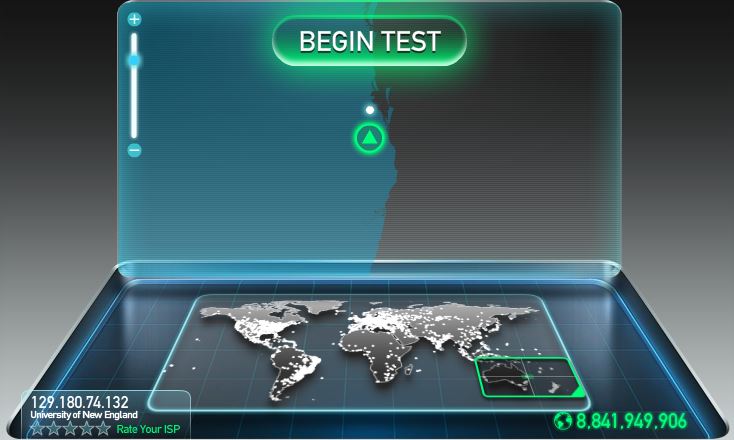Hardware
UNE requires students to have access to an internet enabled computer for their studies at UNE. Below is information on the minimum technical requirements, a browser check and a internet speed test. Please contact the IT Service Desk if you have any questions.
Research students are able to request UNE computing equipment; see Standard Equipment Requests – (HDR).
Step 1: Minimum specifications:
Operating System:
A computer that can run Mac OS10.13 (or higher) or Windows 10.
To update Mac computers: Apple -> About this Mac -> Software Update
To update Windows computers
- Windows 10: Start button -> Settings > Update & Security > Windows Update
Note that Windows 10 S does not allow installs from all sources other than the Windows Store. This may cause issues when installing software that may be essential for study, or support software such as TeamViewer. ProctorU is also not supported by Windows 10 S, so for any exams, it is recommended that you disable Windows 10 S.
See the Microsoft support page on Windows 10 S for more information.
Device Specifications:
If you are completing an online exam, your device will need to meet the ProctorU minimum specification requirements. Please see the ProctorU requirements page here. Recommended specifications are:
| TYPE | MINIMUM | RECOMMENDED |
|---|---|---|
| Internet Connection | Wifi Connection | Wired Connection |
| PC Users | Windows 8 | Windows 10 |
| Mac Users | MacOS 10.13 (Oldest Still Maintained Version) | MacOS 10.15 |
| CPU | more than 2 core CPU less than 85% CPU Usage | more than 4 core CPU less than 50% CPU Usage |
| Webcam | 640x480 resolution | 1280x720 resolution |
| Internet Download Speed | 1 Mbps | 12 Mbps |
| Internet Upload Speed | 1 Mbps | 3 Mbps |
| RAM | 4 GB less than 95% Ram Usage | 16 GB less than 90% Usage |
| Screen Resolution | 1366 x 768 | 1920 x 1080 and above |
Peripherals
- Headphones or speakers (required to listen to lecture and other media provided in units, a USB style headset has proven to provide superior audio quality to the jack style headset when used for online teaching software)
- Headset, including microphone (highly recommended for participation in virtual classrooms)
- Webcam with minimum 1280 x 720 resolution (required for online supervised exams, participation in virtual classrooms and/or media presentations)
Recommended Software
- Microsoft Office 2013 for Windows or higher / Microsoft Office for Mac 2013 or higher (instructions)
- Adobe Acrobat Reader (download Acrobat Reader)
- Anti-virus software (if you haven't one already, see Anti-Virus)
- VLC Media Player - for audio and video files (download VLC Media Player)
Browsers
At least TWO from the list below (though we recommend that you have a second browser installed as backup)
- Google Chrome (download Chrome)
- Firefox (download Firefox) - Firefox is the recommended browser
- Microsoft Edge (pre-installed on Windows)
- Safari for Mac (pre-installed on MacOS)
Step 2: Browser check:
UNE's browser test will check your browser to make sure that all relevant settings are set to allow make full use of our electronic resources. it will take a few seconds to display the results.
Step 3: Bandwidth check:
Run the bandwidth check at Speed Test
A decent network connection is highly recommended when studying online with UNE, as lectures and tutorials are streamed from the web. You are also encouraged to participate in live tutorials, which do have demands on bandwidth.
A connection/download speed of 1.5Mbps minimum is required for study at UNE. This will give you a decent connection to the internet and should cause little delay with downloads of large files (such as electronic readings or podcasts). This speed should be sufficient for low quality audio streams. (Satellite, ADSL, 3G, NBN Fixed Wireless).
Video streaming (such as videoconferencing) or high-quality audio streams require at least 3Mbps. (ADSL 2, ADSL 2+, 3G, 4G, Wireless Broadband, NBN Fibre).
If you take part in a 2-way conversation (for example in an Zoom classroom or during a Teams meeting) and have to have your video and well as your audio active to participate, an upload speed of about 400kbps is recommended.


